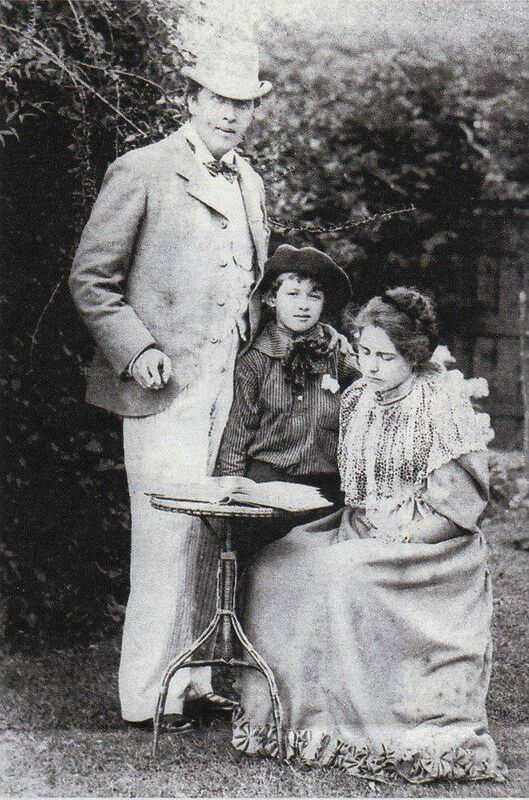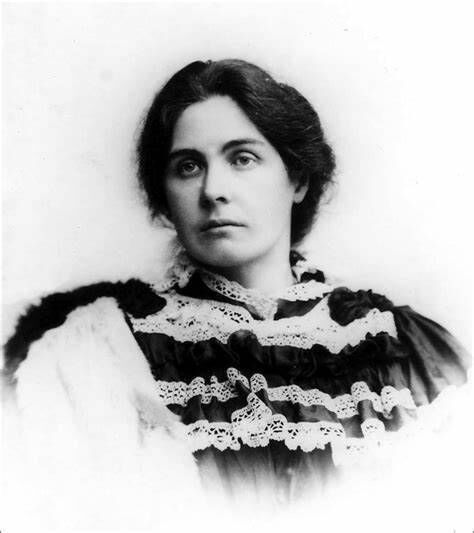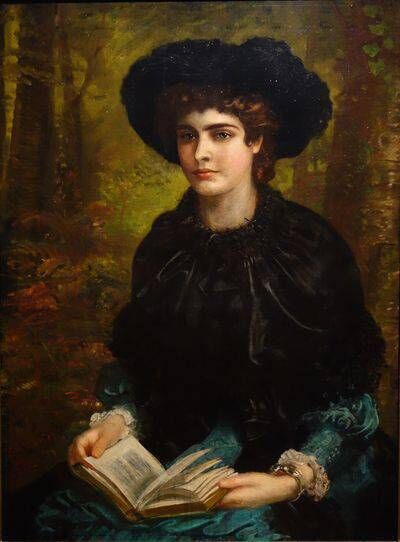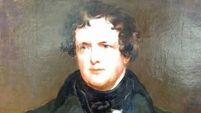Rosita Sweetman: How Oscar Wilde’s forgotten wife Constance paid the price for his fame

Constance Wilde with her son Cyril. She supported votes for women and believed children should be heard, and taught.
Constance Lloyd was the beautiful young daughter of Anglo Irish aristocrats when Oscar Wilde, fresh from America, ‘Walt Whitman’s kiss still on his lip’, met her. She fell instantly, and he, knowing a good thing when he saw it, proposed to his "grave, shy little Artemis with violet eyes".
Even his staunchest supporters were surprised at the speed of the engagement. Many have tried valiantly since to portray it as a love match. It seems more likely Constance provided a smokescreen for his homosexuality, then still a crime.
And a substantial income.
Even on their honeymoon in Paris Oscar abandoned his young wife, as he disappeared to trawl the demi monde.
Constance, whose own parents were so awful — her socialite mother "attacked one with the fire irons", "knocked one’s head against walls" her barrister father exposed himself to nannies, and children — had been given to her grandmother to bring up, and was innocent. A sitting duck for gaslighters like Oscar.
HISTORY HUB
If you are interested in this article then no doubt you will enjoy exploring the various history collections and content in our history hub. Check it out HERE and happy reading
She wrote to her beau: "My whole life is yours to do with what you will." Oscar took her at her word.
A beautiful home in London was created by Constance, with Constance’s money. She threw ‘at homes’, making sure Oscar met all the right people — Whistler, Sargent, Burn-Jones, Sarah Bernhardt, Lilly Langtry, Swinburne, Ruskin, Browning.
She helped with his work, wrote her own, founded the Rational Dress Society urging women to throw off crinolines, corsets and stays. She supported Votes for Women, thought children should be heard, and taught, and that women be allowed congregate in the Dorothy cafes, to smoke and chat, without men.
She published articles, wrote two children’s books, and had two children. As one New York critic said: "Constance was no dish rag." On the outside, everything still seemed spiffing but our own WB Yeats visiting one day spotted "a certain artificial contrivance".
How right he was.
While Constance hosted parties, corrected Oscar’s manuscripts, ran the house, brought up his children, Oscar was busy playing offside. Initially with a young friend of friends who’d come to rent a room, later, and fatally, with Bosie.

Oscar’s nemesis, ‘that terrible person’, that ‘BEAST’, the beautiful and merciless younger son of the Marquess of Queensbury, even more spoilt, more addicted to the pleasures of rough trade, than Oscar. Off they travelled nightly, high on champagne, to meet rent boys off Oxford Street. "Like feasting with panthers," said Oscar delightedly.
Constance was torn asunder with confusion and jealousy. A photo of the time shows all three in the garden. Oscar plump as a porpoise looks down at his "dear boy". Constance stares at the ground. Oscar, now dedicating books for his violet-eyed Artemis, "To You the Cathedral is dedicated. The individual side chapels are to other saints." Sorry, what?
Around this time, Constance tripped on a stair rod and went catapulting down injuring her back; triggering "creeping paralysis", with which she was afflicted for the rest of her life.
The caca hit the fan when the Marquess, Bosie’s angry dad, who’d just lost his older, also gay son, to suicide, left a card at Oscar’s club: ‘To Oscar Wilde, posing as a somdomite [sic]’.
It was okay to be a ‘fop’, a ‘dandy’. To dress outrageously. Spout bon mots. Tickle the fancies of the haute bourgeois. But being ‘queer’ was illegal. It carried the death penalty. And ostracism.
Three grim court cases, urged by Bosie, followed. The rent boys’ testimony dropping Oscar’s name into the mud. London’s adoring crowds became a baying mob.

Constance, frantic to save her children, herself, even Oscar, from the storm, rushed to his mother, begging her to tell Oscar to flee. ‘Speranza’, who considered herself a muse for the people of Éire no less, parped, "no son of mine", etc. Oscar’s last chance of escape closed. He was arrested and jailed.
Constance followed their sons to the continent where they never again had a home, or a father. Or peace, or happiness. They lived in fear of being discovered as the wife and sons of the terrible Oscar Wilde. The beautiful home in Tite Street was stripped. Treasures sold for a song. Even the children’s toys auctioned off.
Constance, now with very little money — most of it having gone down Oscar and Bosie’s throats in the form of champagne — supported Oscar throughout his jail time, never badmouthed him to the children, writing to friends: "That poor poor fellow. What a tragedy for him who is so gifted."
Oscar never stopped badmouthing her. "My wife" he wrote airily, "does not understand my art or have any interest in it." And, he’d been "bored witless" by married life.
He "is very repentant and minds most of all what he has brought on me and the children," wrote Constance as she travelled, half crippled, to Reading Gaol to tell Oscar of the death of his mother — so that he wouldn’t hear it from "alien lips".
Constance! you want to yell. His mother was a narcissistic old baggage who, like her son, lived off your money and was responsible for how your apex narcissist of a husband turned out.
Come on.
Here comes the even worse bit. Oscar, out of jail, wrote he was coming to Italy! They should, for the sake of the boys, try and reconcile! Constance, who’d just returned from the local inn where she’d hired fresh linen to put on the reconciliation bed, got the news that Oscar was coming alright, but travelling with "that terrible person", Bosie.
Her screams echo down the decades: "I forbid you to see Lord Alfred Douglas!" "I forbid you to return to your filthy insane life!" "I forbid you to come to Genoa!"
It was the final death blow. In endless pain since her fall at Tite Street, she decided on another operation after which she developed "uncontrolled vomiting". Five days later, at just 39, she was dead.
Her boys were picked up from their German boarding schools and escorted back to Blighty.
Certainly it was terrible what happened to Oscar. Terrible that being gay was then a crime. Terrible his brutal punishment. But his subsequent deification has overshadowed Constance’s tragedy, and that of her "poor darling boys".

If it hadn't been for her money, her love and loyalty, her support of his writing, would he even have become the great Oscar Wilde?
His best 'witticism' came when alone, abandoned, impoverished, begging, he was asked why he wasn’t writing. "I wrote when I didn’t know life. Now that I know life I have no more to write."
Tragically for Constance, for the two boys, his self awareness came too late. He had destroyed them all.












